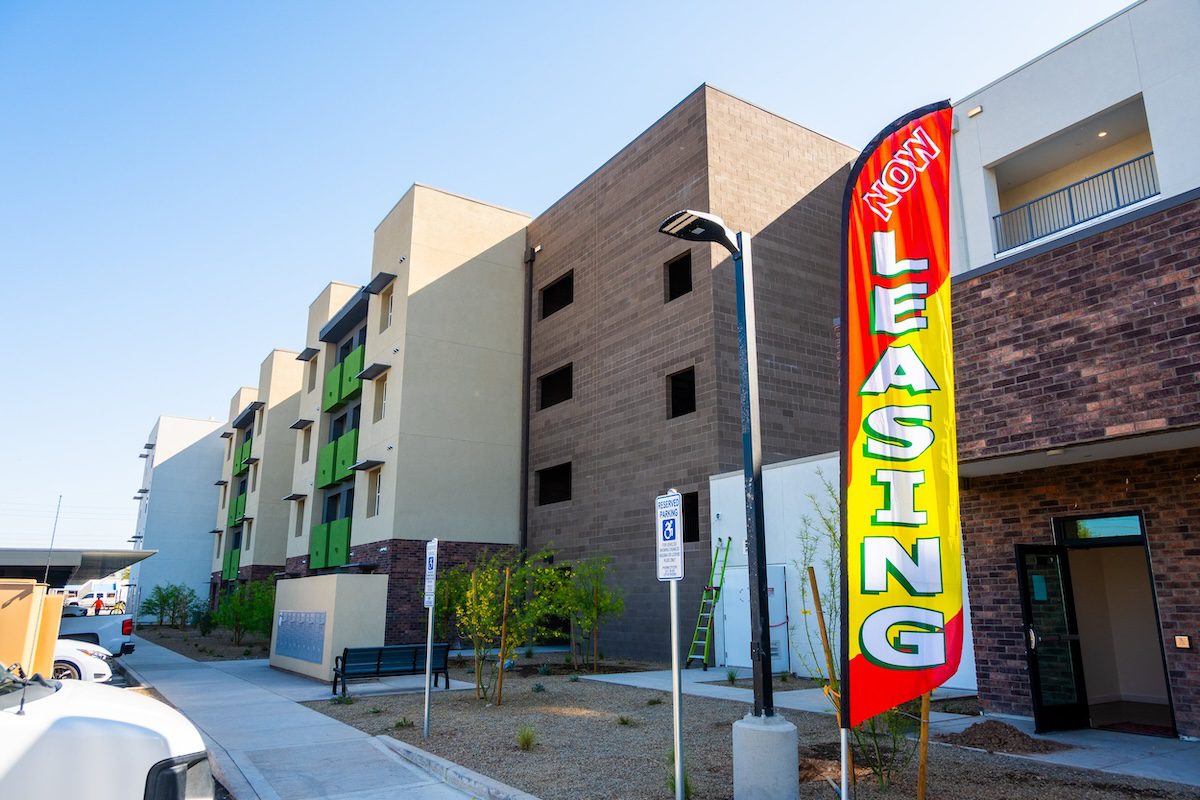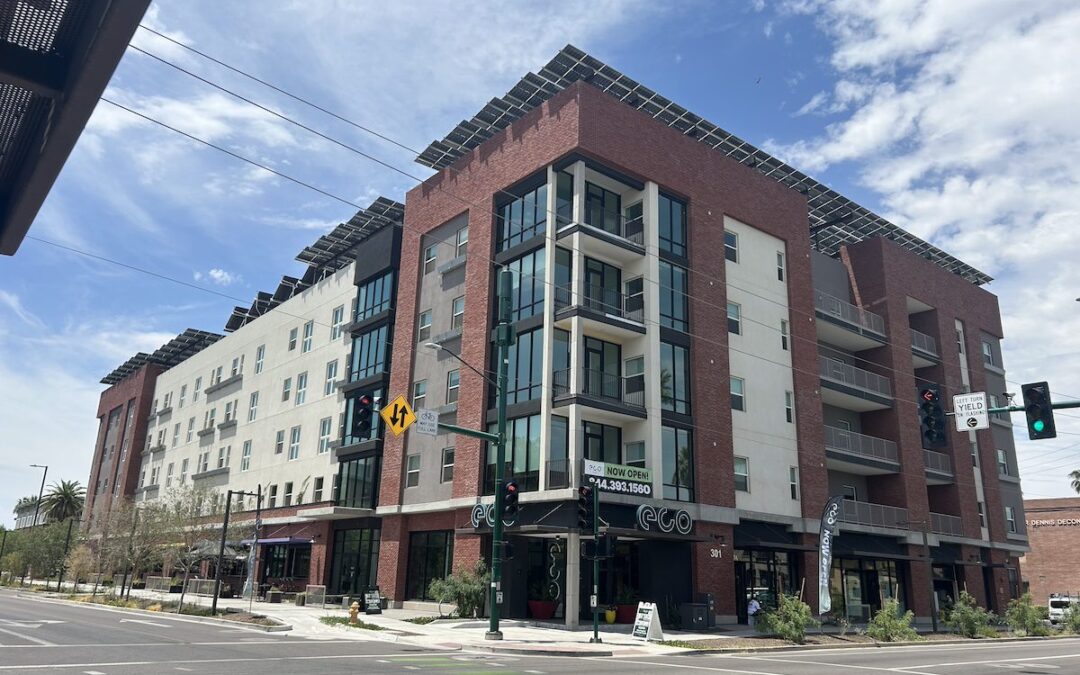
La Esperanza Terrace will begin leasing to tenants in Phoenix this month. (Photo courtesy of UMOM New Day Centers)
More affordable housing is coming to Phoenix thanks to an allotment of American Rescue Plan Act (ARPA) funds and a unique collaboration between Maricopa County, the city of Phoenix, and Isaac School District.
This 96-unit complex, called La Esperanza Terrace, is an affordable housing rental community that will serve individuals and families earning at or below 60% of the area’s median income. It features one-to-three-bedroom rental units and is developed by UMOM New Day Centers, a local nonprofit organization.
UMOM provides housing and supportive services to single women and families facing homelessness—everything from emergency shelter to over 900 affordable units it has built across the Valley through partnerships with local governments, corporate funding support, and Low-Income Housing Tax Credit funding.
La Esperanza Terrace is one of UMOM’s largest permanent affordable housing developments, with nearly 100 units.
The complex’s amenities include a community room, BBQ area, picnic tables, computer lab, fitness center, community garden, bike racks, covered parking, a playground, and security cameras. There will also be computer training, financial literacy resources, and job-seeking resources available to residents, who will begin moving in this month.
Community collaboration
This type of “all-hands-on-deck” approach from the city of Phoenix will continue until every Arizonan has a safe place to call home, said Phoenix Mayor Kate Gallego in a press statement.
“It’s more than just affordable housing—it’s a commitment to ensuring our families have the resources they need to thrive,” said Phoenix City Councilwoman Laura Pastor in a press release. “By working together with our partners, we are transforming vacant land into a foundation for opportunity, stability, and growth for generations to come.”
The housing is built on former Isaac School District land near 31st Avenue and McDowell Road in west Phoenix, where a preschool previously operated in Pastor’s council district.
It is one of three similar partnerships with local school districts, which has generated more than 300 new affordable housing units through similar initiatives.
READ MORE: Phoenix school districts convert unused land into 264 affordable homes
The project’s funding came from a number of sources, including the Arizona Department of Housing’s Housing Trust Fund, but the largest amount drew from federal ARPA funding.
The act allocated $6 million from the Maricopa County Board of Supervisors’ share of ARPA funds to the project, and $1 million from the city of Phoenix’s ARPA funding.
Overall, Maricopa County has invested more than $128 million in ARPA funding for affordable housing programs and projects.
La Esperanza Terrace is part of the city of Phoenix’s Housing Phoenix Plan, a piece of which is dedicated to redeveloping existing city-owned land with mixed-income housing through new funding sources and land acquisition.
The plan, dedicated to creating or preserving 50,000 units by 2030 surpassed its goals five years early, in part because of the partners the city is able to work with, Gallego said.
But, even with this investment, homelessness is still on the rise in Arizona and housing costs remain unaffordable for the vast majority of Phoenix residents.
There are more people entering homelessness than leaving homelessness, according to a Maricopa Association of Governments report, and the income needed to afford a median-priced house in Arizona has spiked 70% in the last five years.
Households are considered “cost burdened” when they pay more than 30% of their gross income towards housing costs—in Phoenix, more than half of renter households and nearly one-quarter of owner households meet that criteria. And a quarter of Phoenix renter households are considered severely cost burdened and pay more than 50% of their income towards shelter, according to the city of Phoenix’s 2024 Housing Needs Assessment.
Promise to families
“La Esperanza Terrace is more than just a building, it is a promise for families that are building stronger and more inclusive communities,” Patricia Jimenez, Isaac School District board president, said at the grand opening ceremony of La Esperanza Terrace. “It was not an empty space.”
This is the first affordable housing project to be financed by the School District Surplus Land Initiative, a unique partnership between the city of Phoenix and school districts, where unused land is sold to the city with the intention of using it to create affordable housing.
Once the land is sold to the city, a land-use restriction is placed on the property, which is transferred to the Phoenix Industrial Development Authority (IDA). It becomes the landowner and then works with developers focused on projects that serve a “public purpose.”
The housing complex will remain dedicated to affordable housing for at least 40 years, due to a land use agreement that the city of Phoenix placed on the property prior to its sale.
A second, similar 71-unit affordable housing project to fund the Alhambra Elementary School District is also coming this year, said Juan Salgado at the grand opening ceremony of La Esperanza Terrace. He serves as the CEO of Phoenix IDA, a public entity that provides financial assistance to community and economic development projects.
“With rising housing costs and a record-breaking number of eviction cases filed in 2024, it is clear that Maricopa County families are in dire need of more affordable rental options that don’t break the bank,” said Maricopa County Board Supervisor Steve Gallardo.
The model that La Esperanza Terrace used to achieve the milestone of opening can be duplicated throughout the Valley, Gallardo added.
Empty lots behind the newly built apartments that the city of Phoenix owns will also be dedicated to a mix of different types of affordable housing, some for rent and some for sale, Pastor said.
“Today is about more than just a bunch of new apartments. It’s about creating spaces where families can live safely and work steadily and have a real chance to build a brighter future,” said Jackson Fonder, CEO of UMOM New Day centers. “La Esperanza means hope, and that’s exactly what this place represents.”
Support Our Cause
Thank you for taking the time to read our work. Before you go, we hope you'll consider supporting our values-driven journalism, which has always strived to make clear what's really at stake for Arizonans and our future.
Since day one, our goal here at The Copper Courier has always been to empower people across the state with fact-based news and information. We believe that when people are armed with knowledge about what's happening in their local, state, and federal governments—including who is working on their behalf and who is actively trying to block efforts aimed at improving the daily lives of Arizona families—they will be inspired to become civically engaged.


New downtown Phoenix apartments go all in on green living
I noticed something interesting while I was out grabbing tea at Lola Coffee this week. This new apartment complex in downtown Phoenix called ECO PHX...

Types of Arizona home loans that make buying an obtainable dream
It’s not the avocado toast making home ownership unattainable; it’s the type of loan. Here are several lesser-known home loans that can make...

Need help paying rent in Phoenix? These 10 programs can help
If you’re struggling to find and afford housing, these 10 rental assistance programs in Phoenix can help. Between inflation, price gouging,...

A little bit of farm, a little bit of suburbia: That’s the recipe for Gilbert’s Agritopia
GILBERT, Ariz. (AP) — Just steps from the porticos, patios, clay-tiled roofs and manicured lawns of suburbia, Kelly Saxer has gotten used to...





